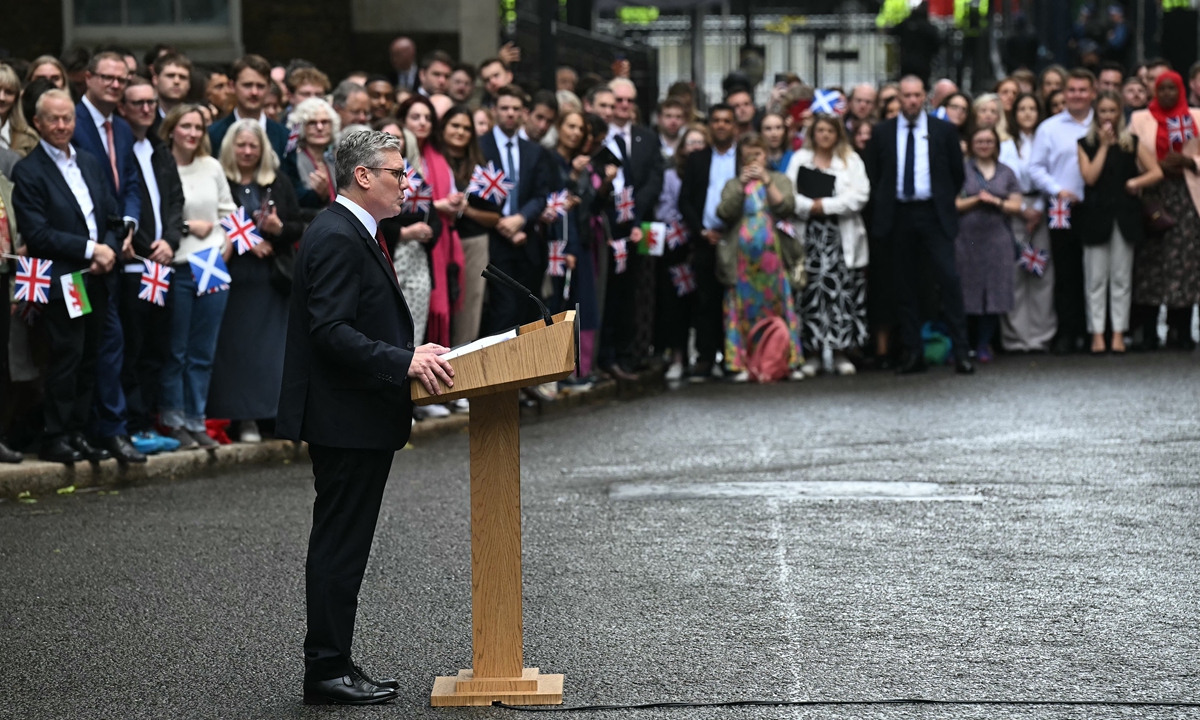
Britain's new prime minister and leader of the Labour Party Keir Starmer addresses the nation after his general election victory, outside 10 Downing Street in London on July 5, 2024, a day after Britain held a general election. Starmer's center-left opposition Labour party swept to a landslide victory, ending 14 years of right-wing Conservative rule. Photo: AFP
On Thursday, July 4, the British public voted to impose a historic defeat on the British Conservative Party and elect Keir Starmer's Labour Party in a landslide. The election marks the first change of ruling party in Britain since 2010, in an era which has been widely defined by political divisions, crises such as Brexit and the pandemic, as well as a struggling economy that remains poorer in real terms than in 2007. There is an appetite for change in the air, and it is hoped the new government will be more sensible, more trustworthy and less instinctive to inflammatory populist rhetoric.Naturally, such a shift in party also means implications for Britain's foreign policy too. Although Keir Starmer has already rejected the left-wing approach of his predecessor Jeremy Corbyn, with such a strong mandate and majority in the House of Commons, he will have space to pursue his own agenda, offset opposition and therefore likely be more pragmatic in respect to Britain's national interests. Undoubtedly this will pave the way for space to reengage one of Britain's most important economic and trading partners, China, and offer a much needed reset after the previous government demolished ties for their own short term political interests.
Although the Conservative government initially started off seeking to deepen trade ties with Beijing in the wake of Brexit, the government led by Boris Johnson soon did a U-turn due to pressure from the US and in identifying China as a convenient scapegoat in deflecting from his own political scandals. Simultaneously, the rise of hawkish politicians influenced by Washington, such as the then ascending Liz Truss, as well as Iain Duncan Smith causing trouble from the backbenches, made it near impossible for the government to be pragmatic when it came to Beijing.
Rishi Sunak personally wanted to reengage with China, but amid the terminal unpopularity of his government and the lack of authority over his leadership, he was never in a position to do so. Instead, the culture of rolling out anti-China announcements, such as opportunistically blaming them for cyber-attacks which had often taken place years previously, continued. Although David Cameron being appointed as foreign secretary was also expected to be an overture to Beijing, this also did not materialize.
Now, Britain is in for a spell of political stability. Starmer has a very strong mandate which will make Labour comfortable for an extended period. Given the geopolitical climate we should not expect his government to absolutely embrace China, not least because Starmer has been intolerant of those in his party critical of Western foreign policy, but certainly it will be less opportunistic, more defined, more mature and therefore more predictable. We should expect the "Brexit Chauvinism" the Conservatives pushed to come to an end. The Labour Party, unlike others, did not commit to any anti-China measures in its manifesto.
This will give China clear space to get relations back on track and therefore distinguish areas of agreement and disagreement in working boundaries. It will not however, be a return to the "golden era" of relations, as Starmer will still be expected to embrace the US strategy and likewise must content with a vicious press in Britain who are scathingly anti-China. We should also expect US funded groups and organizations such as the "Inter-Parliamentary Alliance on China" to also recruit new followers among the new cohort of MPs, many who have right wing foreign policy leanings.
Still, a good model for how things may play out is the example of Anthony Albanese in Australia. On coming to office, Albanese ended the rhetorically abrasive and hostile foreign policy stance of his predecessor Scott Morrison, reengaged with China but nonetheless still remains an ally of the US and part of its geopolitical groupings. Australia's position did not really change but it moderated in a productive manner, and this will be key for the UK under Starmer.
The change of government in Britain is being viewed with cautious optimism. We should see it as the end of a very negative period in British politics and economic management. A strong government offers opportunities in terms of domestic policies and therefore direction in foreign policy. Starmer is at heart a pragmatist, he is a man who has had a trusted career, exercised good judgement and has avoided being overly zealous. It is time for Britain and China to stabilize relations accordingly and end the yellow peril hysteria the Conservatives frequently invoked for their own gain. The two countries continue to have a great deal to benefit from engaging with one another.
The author is a political and historical relations analyst. opinion@globaltimes.com.cn



